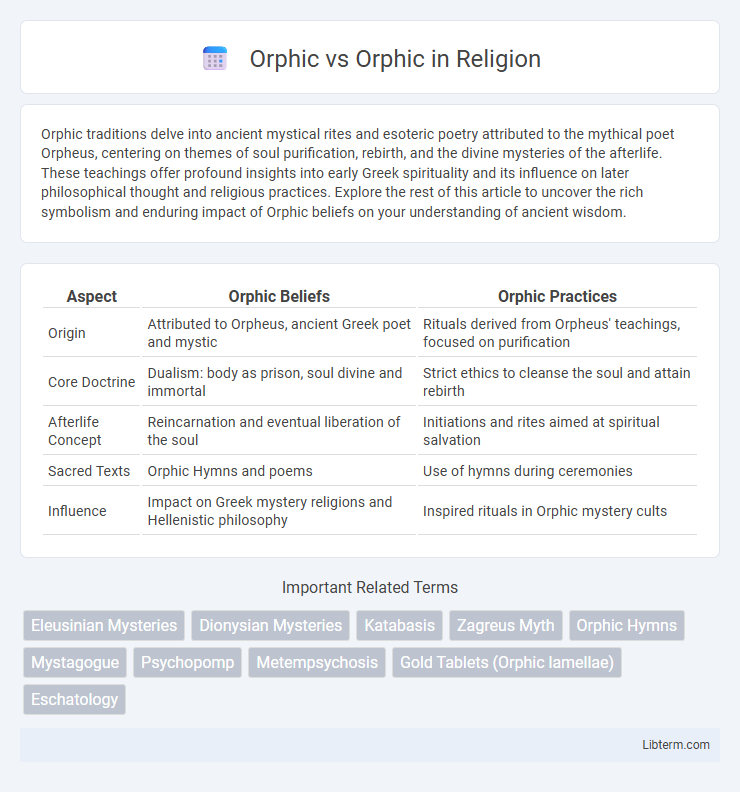Orphic traditions delve into ancient mystical rites and esoteric poetry attributed to the mythical poet Orpheus, centering on themes of soul purification, rebirth, and the divine mysteries of the afterlife. These teachings offer profound insights into early Greek spirituality and its influence on later philosophical thought and religious practices. Explore the rest of this article to uncover the rich symbolism and enduring impact of Orphic beliefs on your understanding of ancient wisdom.
Table of Comparison
| Aspect | Orphic Beliefs | Orphic Practices |
|---|---|---|
| Origin | Attributed to Orpheus, ancient Greek poet and mystic | Rituals derived from Orpheus' teachings, focused on purification |
| Core Doctrine | Dualism: body as prison, soul divine and immortal | Strict ethics to cleanse the soul and attain rebirth |
| Afterlife Concept | Reincarnation and eventual liberation of the soul | Initiations and rites aimed at spiritual salvation |
| Sacred Texts | Orphic Hymns and poems | Use of hymns during ceremonies |
| Influence | Impact on Greek mystery religions and Hellenistic philosophy | Inspired rituals in Orphic mystery cults |
Introduction to Orphic Traditions
Orphic traditions center on the mystical teachings attributed to Orpheus, emphasizing the soul's immortality and the cycle of reincarnation. These traditions include hymns, rituals, and myths that explore themes of purification and the afterlife, distinct from mainstream Greek religion. Fundamental Orphic texts, such as the Orphic Hymns and the gold tablets, provide insight into esoteric beliefs about divine origins and the path to spiritual salvation.
Origins and Historical Context of Orphism
Orphism originates in ancient Greece, rooted in mystical religious beliefs attributed to the mythical poet Orpheus, whose teachings emphasized the soul's immortality and purification through ritual. This esoteric tradition diverged from mainstream Hellenic religion by promoting a dualistic worldview and the practice of secret rites linked to the afterlife. Orphism played a critical role in shaping early Greek spirituality, influencing philosophical thought and mystery cults from the 6th century BCE onward.
Orphic Texts: Variations and Discrepancies
Orphic texts, attributed to the mythical poet Orpheus, exhibit significant variations and discrepancies across manuscripts due to their oral transmission and diverse regional influences. Key Orphic works like the "Orphic Hymns," "Derveni Papyrus," and "Gold Tablets" reveal inconsistencies in theological themes, ritual details, and cosmogonic narratives, reflecting evolving religious interpretations. These textual divergences complicate scholarly attempts to define a unified Orphic doctrine, highlighting the fluid nature of ancient mystery traditions.
Philosophical Foundations of Orphic Beliefs
Orphic beliefs center on a dualistic cosmology that distinguishes the immortal soul from the mortal body, emphasizing purification and rebirth. The philosophical foundations are rooted in ancient Greek spirituality, where Orphism presents a cosmogony involving the primordial deity Phanes and a cyclical process of soul transmigration. This system contrasts with other Greek religious traditions by focusing on esoteric knowledge, ritualistic purity, and the soul's liberation from the cycle of reincarnation.
Ritual Practices in Orphic Traditions
Orphic ritual practices emphasize purification through fasting, prayer, and initiation ceremonies designed to prepare the soul for its journey after death. Central to these rites are the use of sacred hymns and the consumption of symbolic substances like honey and wine, believed to facilitate divine communion. The mystery traditions focus on personal spiritual transformation, encouraging adherents to adhere to ethical codes that support the soul's liberation from the cycle of rebirth.
Orphic Mysteries: Symbols and Meanings
Orphic Mysteries revolve around symbolic representations drawn from ancient Greek religious rites attributed to Orpheus, emphasizing themes of rebirth, purification, and the soul's journey. Key symbols include the lyre, representing divine music and cosmic harmony, and the ouroboros, signifying eternal cyclicality and regeneration. These symbols convey esoteric meanings central to understanding Orphic teachings on the afterlife and spiritual enlightenment.
Comparative Analysis: Orphic Interpretations
Orphic interpretations reveal distinct thematic and philosophical nuances within ancient Greek religious texts, emphasizing cosmogony and eschatology differently across variants. While one Orphic tradition centers on the soul's divine origin and its cyclical transmigration, another highlights ritual purity and the myth of Dionysus's dismemberment. Comparative analysis underscores variations in sin, redemption, and the metaphysical relationship between humans and gods, reflecting evolving spiritual doctrines in Orphism.
Influence of Orphism on Ancient Philosophies
Orphism significantly shaped ancient Greek philosophical thought by introducing the concept of the soul's immortality and the cycle of rebirth, which influenced Pythagorean and Platonic traditions. The Orphic emphasis on purification rituals and esoteric knowledge contributed to early metaphysical inquiries about the nature of existence and the afterlife. This spiritual framework provided a foundation for ethical teachings and cosmological views in subsequent philosophical schools.
Modern Relevance of Orphic Concepts
Orphic concepts, rooted in ancient Greek mysticism and poetry attributed to Orpheus, continue to influence modern spirituality, psychology, and esoteric traditions by emphasizing themes of transformation, the soul's immortality, and cosmic harmony. Contemporary interpretations of Orphic teachings inform practices in neo-paganism, Hermeticism, and psychological archetypes, highlighting the perennial relevance of mythic symbolism in personal and collective evolution. The resurgence of interest in Orphic mysteries reflects a broader cultural fascination with integrating ancient wisdom into modern metaphysical and philosophical discourse.
Conclusion: Re-examining Orphic Dualities
Orphic dualities reveal complex layers within ancient Greek spirituality, emphasizing the interplay between the mortal and divine aspects of the soul. The variation between Orphic interpretations reflects evolving metaphysical understandings and ritual practices that shaped mystery traditions. Re-examining these dualities highlights the dynamic nature of Orphism as both a philosophical and religious framework influencing Greek esoteric thought.
Orphic Infographic

 libterm.com
libterm.com